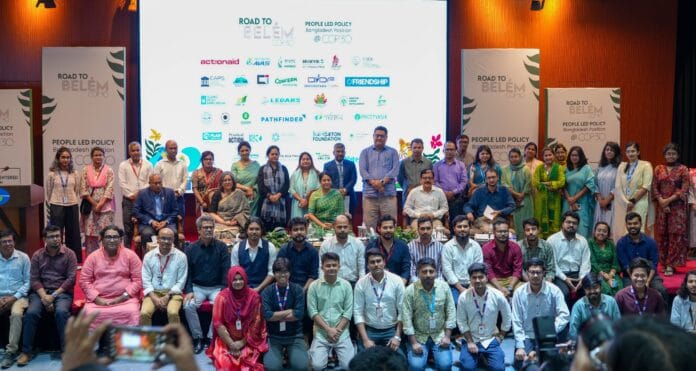Bangladesh must undertake a fundamental rethink of its development model to ensure climate justice, prioritising mitigation and shifting away from unsustainable consumption, Environment Adviser Syeda Rizwana Hasan said on Tuesday.
Speaking at a policy dialogue titled “People-led Policy: Bangladesh Position at COP30” at the Department of Environment auditorium in Agargaon, Dhaka, Hasan urged the government to adopt a stronger political stance on climate finance and global equity.
“The global commitments on climate finance must be fulfilled,” she said. “If developed countries fail to enhance their contributions to climate action, the survival of climate-vulnerable nations like ours will be at stake. Bangladesh must take a stronger stance on the question of climate justice.”
The event marked the launch of a Civil Society Organisations (CSO) Position Paper outlining Bangladesh’s priorities ahead of COP30, to be held in Belém, Brazil. The document reflects inputs from grassroots communities across the country’s most climate-affected regions and was jointly prepared by 35 national and international organisations.
Hasan praised the CSO initiative, calling it “a step towards greater coherence between civil society and government efforts in climate governance.” She warned that monetary compensation alone cannot offset the devastation wrought by climate change.
“No amount of finance can restore our eroded rivers, lost biodiversity, or human security,” she said. “Environmental and climate risks must be placed at the centre of all development planning. If we fail to embed climate justice within our development vision, economic growth will cease to be humane or sustainable.”
Participants at the event called for the Loss and Damage Fund to be made operational and easily accessible to affected women, children, and marginalised groups, free from bureaucratic hurdles. They also demanded recognition of non-economic losses, such as cultural heritage and public health, in global climate accounting.
Speakers stressed that wealthy nations must meet their emission reduction pledges, ensure fairness in the energy transition, and prioritise gender equality and youth leadership in decision-making. They also backed a global proposal for a “Belém Action Mechanism for a Global Just Transition (BAM)” under the UN climate framework.
Farah Kabir, Country Director of ActionAid Bangladesh, said the position paper aimed to amplify the voices of those most affected by the climate crisis.
“Women and children in marginalised communities bear the heaviest burden,” she said. “Gender equality and women’s empowerment must be central to all climate policies.”
Dr S.M. Munjurul Hannan Khan, Executive Director of Nature Conservation Management (NACOM), highlighted the potential of Article 6 of the Paris Agreement to strengthen climate finance and technology transfer.
“By leveraging carbon markets, we can enhance climate finance flows and reinforce the leadership role of climate-vulnerable countries,” he said.
The session was chaired by Dr Md Sohrab Ali, Additional Director General of the Department of Environment, with Shawkat Ali Mirza, Director at the department, as special guest. Both lauded the CSO-led process as an important step towards aligning civil society advocacy with state policy.
Presentations were delivered by Roufa Khanum of BRAC University’s C3ER, Abul Kalam Azad of ActionAid Bangladesh, M. Mofazzal Hossain of Change Initiative, Afsari Begum of Concern Worldwide, and Sadia Akter, Associate Trainer.
The event drew participation from government officials, development partners, researchers, climate activists, and journalists.

